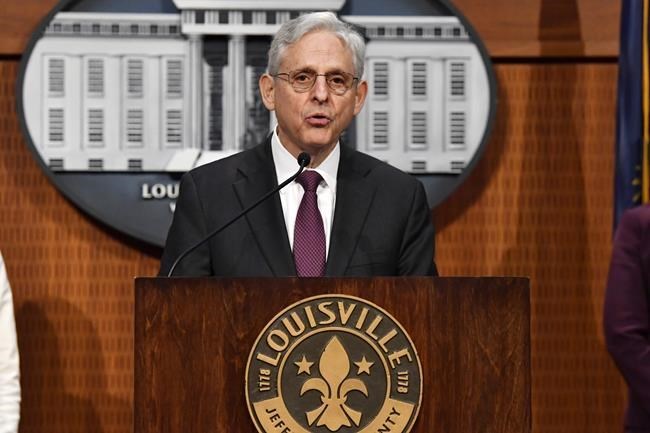LOUISVILLE, Ky. (AP) — The U.S. Justice Department found Louisville police have engaged in a pattern of violating constitutional rights and discrimination against the Black community following an investigation prompted by the fatal police shooting of Breonna Taylor.
Attorney General Merrick Garland made the announcement Wednesday. A Justice Department report found the Louisville/Jefferson County Metro Government and Louisville Metro Police Department “engage in a pattern or practice of conduct that deprives people of their rights under the Constitution and federal law.”
The report said the Louisville police department “discriminates against Black people in its enforcement activities,” uses excessive force and conducts searches based on invalid warrants. It also said the department violates the rights of people engaged in protected speech, like the street protests in the city in the summer of 2020 after Taylor's death. Garland said some officers have assaulted people with disabilities and called Black people disparaging names.
“This conduct is unacceptable, it is heartbreaking,” Garland said. “It erodes the community trust necessary for effective policing and it is an affront to the vast majority of officers who put their lives on the line every day to serve Louisville with honor.”
The sweeping probe announced in April 2021 is known as a “pattern or practice” investigation — examining whether there is a pattern of unconstitutional or unlawful policing inside the department. The city will sign a negotiated agreement with the Justice Department and a federal officer will monitor the progress.
Louisville Mayor Craig Greenberg said the city “has wounds that are not yet healed.”
“We have to come to terms with where we’ve been, so we can get to where we want to be,” Greenberg said.
Taylor, a 26-year-old Black woman, was roused from her bed by police who came through the door using a battering ram after midnight on March 13, 2020. Three officers fired shots after Taylor’s boyfriend, fearing an intruder, shot an officer in the leg. Taylor was struck several times and died at the scene.
The warrant used to enter her home is now part of a separate federal criminal investigation, and one former Louisville officer has already pleaded guilty to helping falsify information on the warrant. No drugs were found in Taylor’s home. Two more officers are charged in the warrant probe, and a third, Brett Hankison, is charged with endangering Taylor and her neighbors with his shots into her apartment.
One of the attorneys for Taylor's family, Ben Crump, said the family was encouraged by the Justice Department's results.
“These findings, and LMPD’s expected cooperation with the DOJ’s recommended remedial measures, will help protect the citizens of Louisville and shape its culture of policing,” Crump said in a news release.
The report said Black motorists were more likely to be searched during traffic stops, and officers used neck restraints, police dogs and Tasers against people who posed no imminent threat. Garland cited one incident where two officers threw drinks at pedestrians and recorded the encounters. Those incidents happened in 2018 and 2019. Both officers are facing federal charges.
Louisville police have undergone five leadership changes since the Taylor shooting, and new Mayor Craig Greenberg is interviewing candidates for the next chief. The city has settled a number of lawsuits related to the incident, including a $12 million payment to Taylor’s family that ended a wrongful death lawsuit.
Garland also mentioned some reforms the city has undergone since Taylor's death, including a city law banning the use of “no-knock” warrants in 2020. The warrants are typically used in surprise drug raids. The city also started a pilot program that aims to send behavioral health professionals to some 911 calls, expanded community violence prevention efforts and sought to support health and wellness for officers, the report said.
Dylan Lovan, The Associated Press



